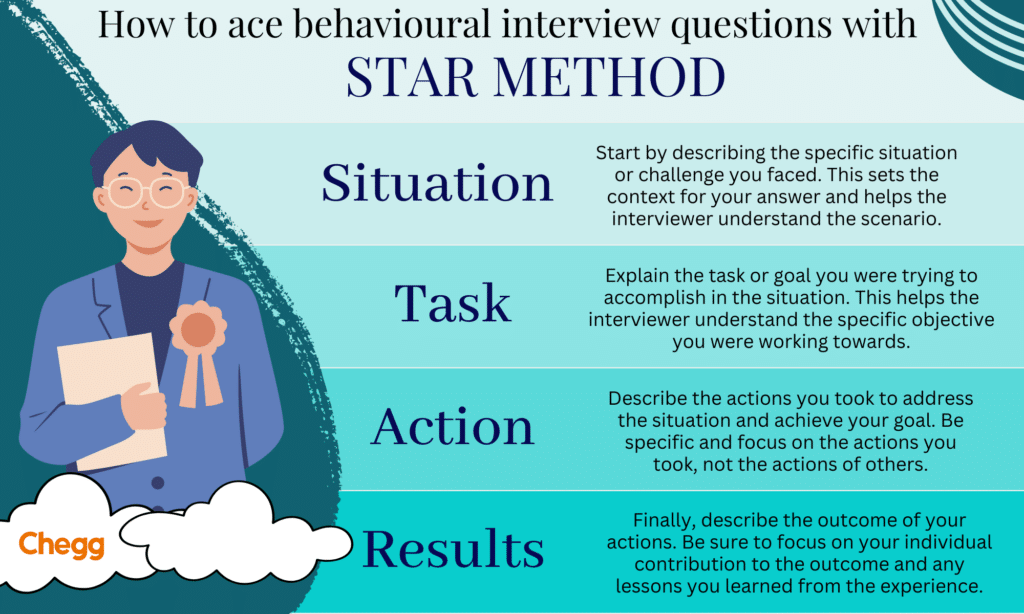
Quick Summary
Behavioural Interview Questions assess problem-solving, teamwork, and adaptability based on past experiences.
Use the STAR Method (Situation, Task, Action, Result) for clear, structured answers.
Preparation is Key – Practice responses, stay confident, and align answers with company values.
Table of Contents
Preparing for a job interview can be nerve-wracking, especially when facing behavioural interview questions. These questions are designed to assess how you’ve handled various workplace situations in the past, helping recruiters predict your future performance.
Behavioural interview questions are a key part of the hiring process, as they allow employers to evaluate your problem-solving abilities, teamwork, leadership skills, and adaptability. According to a CareerBuilder survey, 50% of employers decide within the first five minutes whether a candidate is a good fit. This underscores the importance of making a strong first impression, particularly when answering behavioural interview questions.
These open-ended questions require specific examples, making preparation essential. In this blog, we’ll explore the Top 20 behavioural interview questions and provide expert tips to help you craft strong responses. With the right approach, you can tackle your next interview with confidence and improve your chances of landing the job.

Behavioural interview questions are a crucial tool used by recruiters to evaluate a candidate’s ability to handle real-world workplace situations. Unlike traditional interview questions that focus on hypothetical scenarios, behavioural interview questions require candidates to provide concrete examples from their past experiences. These questions assess a wide range of soft skills, including communication, teamwork, leadership, and problem-solving abilities.
A well-prepared response to behavioural interview questions can help candidates stand out from the competition. Employers often use the STAR method (Situation, Task, Action, Result) to structure their evaluation, ensuring that answers are clear, concise, and relevant. For instance, a question like, “Tell me about a time you handled a conflict with a coworker,” allows the candidate to showcase their conflict resolution and interpersonal skills. Strong answers highlight problem-solving approaches, emotional intelligence, and professional growth. Mastering behavioural interview questions is essential for job seekers looking to make a lasting impression and demonstrate their potential for success in a given role.
Example: During my college fest, I encountered a conflict with my co-organizer. To handle the situation effectively, I applied behavioural interview questions principles—staying calm, actively listening, and presenting my ideas logically. Through open discussions, we reached a mutual decision, strengthening my teamwork and conflict-resolution skills.
Points to keep in mind:
Example: I was asked to give a presentation to a new client. I made sure that before we began working, the views of each team member were put on the table and discussed thoroughly. I then gave specific roles to different people keeping in mind their expertise. Finally, I compiled all the work for the final presentation.
Points to keep in mind
Example: I am experienced with working in C++ but I was once assigned an important project in python. I believe challenges are inevitable and hence before starting the project I spent a week learning python and its basic. As a result, I was able to timely submit the project to my senior.
Points to keep in mind:

Example: In my previous role at the bank, I frequently handled upset customers. One instance involved a client frustrated with failed online transactions. Using my problem-solving skills and applying behavioural interview questions techniques, I reassured him, coordinated with my team, and resolved the issue within hours, ensuring customer satisfaction.
Points to keep in mind:
Example: On the occasion of our company event the PR team was unable to fetch media partners. I got together some people from the team and contacted our media partners from previous years, negotiated a few terms and conditions and within 3 days it was all done.
Points to keep in mind:
Example: Being the HR at my previous workplace, I once had to resolve a conflict between two co-workers. Each of them had their version of the situation. It was necessary to uphold the truth and it took me some digging into the matter and consultation with other office members to reach a fair conclusion.
Points to keep in mind:
Example: In school, we convinced our principal to establish a basketball team and let us compete in the zonal matches. A few months later, we returned victorious—with a trophy for the team and a Player of the Tournament medal around my neck. This experience reflects teamwork, persistence, and leadership—key qualities often assessed in behavioural interview questions.
Points to keep in mind:
Example: At my previous job, days before an important meeting my co-worker met with an accident and the responsibility of guiding his team fell upon me. I divided the time slots in the day between the two teams working under me and took turns working with each one of them.
Points to keep in mind:
Example: In the days when I worked in an MBA institute, a professor was unable to attend college on the day of assessment. Being an MBA graduate myself, I discussed with the professor and made the students a question paper then and there which they solved and submitted.
Points to keep in mind:
Example: I noticed my team was not fully engaged in the new project, often skipping meetings. I addressed this concern with my team leader and collaborated on a plan to re-engage the members. By the weekend, we held a productive team meeting that successfully refocused everyone’s attention—an experience that highlights problem-solving and leadership, essential for tackling behavioural interview questions.
Points to keep in mind:
Example: At my previous office, we were supposed to submit weekly work reports. I always made sure they were detailed, well maintained and easy to read and further work with.
Points to keep in mind:
Example: During my design internship, I collaborated with a teammate who favored international designs, while I had a strong inclination toward Indian styles. Despite our differences, we combined our perspectives and successfully created an Indo-Western fusion design. This experience highlights my adaptability and teamwork—key aspects often explored in behavioural interview questions.
Points to keep in mind:
Example: I had my appointment at the passport office on the same day as an important presentation. I wrapped up the work a day prior and went for the appointment the next morning. I was continuously in touch with my team and managed the presentation via an online meeting with the client.
Points to keep in mind:
Example: As the assistant director of my college dramatics society, I once forgot to book the venue while managing multiple responsibilities. On the day of the play, I quickly approached the auditorium management, explained the situation, and secured special permission for our performance. This experience reflects my problem-solving skills and ability to stay composed under pressure—key traits often assessed in behavioural interview questions.
Points to keep in mind:
Example: I worked as a class 12 mathematics teacher. One day I was asked to be the substitute teacher for class 5 until a new teacher was found. This was an exciting chance yet challenging as it required more effort to make those little ones understand mathematics. I borrowed help from videos and activities to teach them over those 6 months. This was the time when I worked outside of my comfort zone.
Points to keep in mind:
Example: In college, as the president of the dance society, I led a collaboration with the dramatics society for an international event. We created a unique fusion performance that showcased our teamwork and creativity, ultimately winning third prize. This experience highlights my leadership and adaptability—key aspects often evaluated in behavioural interview questions.
Points to keep in mind:
Example: During my research project, I had to convey all the details I learned in a seminar to my co-workers. I did so by simplifying the information using mind maps and flowcharts and had multiple group discussions on the same.
Points to keep in mind:
Example: At my previous workplace, I realized there was no Internal Complaint Committee. Understanding its importance, I engaged in multiple discussions with HR over two months. My persistence paid off when we successfully established the company’s first ICC. This experience demonstrates my initiative and problem-solving skills—key qualities often assessed in behavioural interview questions.
Points to keep in mind:
Example: I once had to convince my team leader of the idea of giving the team a small gap while working with different clients. I explained to her in a very detailed manner how switching between clients is confusing and hinders productivity.
Points to keep in mind:
Example: In college, as the president of the cultural society, I led my team in convincing our convenor to allow a performance on a sensitive social issue. We persistently wrote applications to the principal and engaged in daily discussions with the convenor. Our dedication paid off, and we were granted permission. This experience showcases my leadership, perseverance, and teamwork—qualities often evaluated in behavioural interview questions.
Points to keep in mind:
When answering behavioural interview questions, provide specific details about the situation, your role, and the actions you took to resolve the issue or accomplish the task. This shows your interviewer that you have experience in handling real-world situations.
While it’s important to showcase your strengths, it’s also important to be truthful about your experiences. Behavioural interview questions, Do not try to exaggerate or make up experiences as this can backfire during the interview process.
Even if the situation you describe was challenging, behavioural interview questions try to focus on the positive outcomes of the situation and the skills you developed. This demonstrates your ability to learn from experiences and improve your skills.

The STAR method is a structured approach to behavioral interview questions and answers. The acronym stands for Situation, Task, Action, and Result.
Situation: Begin by describing the situation that you faced. Be specific and provide details about the context, including the time frame, people involved, and any challenges.
Task: Next, describe the task that you needed to accomplish in the situation. This should include your role and responsibilities.
Action: Describe the actions that you took to address the situation and accomplish the task. Be specific about the steps you took and why you took them.
Result: Finally, describe the results of your actions. Include any positive outcomes, what you learned from the experience, and how it helped you grow professionally.
Also Read:
Behavioural interview questions play a crucial role in showcasing your skills, experience, and ability to handle workplace challenges. As a job seeker, preparing thoughtful responses to behavioural interview questions is essential for demonstrating your qualifications and increasing your chances of securing your dream job.
By practicing and structuring your answers using the STAR method (Situation, Task, Action, Result), you can provide clear and compelling examples that highlight your problem-solving abilities, teamwork, leadership, and adaptability. Employers use behavioural interview questions to assess how you have handled past situations, making it critical to respond with confidence, honesty, and positivity.
To stand out from the competition, ensure your responses align with the job role and company values. Preparing well for behavioural interview questions allows you to present yourself as a strong and capable candidate, leaving a lasting impression on hiring managers. By refining your answers and delivering them effectively, you can boost your confidence, impress interviewers, and take a significant step toward achieving your career goals.
Ace your job interviews with tailored tips for a great first impression! Explore more Interview Tips with us.
Behavioural interview questions: Keeping in mind the job description that you applying for, make a list of your strengths and weaknesses. Take note of your experiences to use in place of mainstream answers. Use the STAR technique. Prepare a few questions to ask after the interview in the context of your job profile
The STAR method is a four-step method that helps you build precise and realistic anecdotes. It involves explaining the situation, your roles and responsibilities, the steps and actions you took and the result you got.
1. Give examples highlighting your strengths
2. Sound confident and optimistic
3. Dress neatly
4. Ask questions and be interactive
5. Pay attention to detail
To assess growth potential, ask behavioral questions that reveal a candidate’s adaptability, motivation, and problem-solving skills. Examples include:
1. When was the last time you asked for feedback? (Openness to learning)
2. What’s your biggest career achievement? (Drive and ambition)
3. Tell me about a time you learned a new skill quickly. (Adaptability)
4. Describe when you improved a process or solved a problem. (Initiative)
5. Have you ever failed at something? How did you handle it? (Resilience)
The 5 P’s of Interview—Preparation, Practice, Presentation, Positivity, and Performance—are essential for excelling in behavioral interview questions. This framework helps candidates effectively structure their responses, showcase relevant experiences, and demonstrate confidence. By focusing on each of these areas, you can improve your interview skills and leave a lasting impression on hiring managers.

Authored by, Amay Mathur | Senior Editor




Amay Mathur is a business news reporter at Chegg.com. He previously worked for PCMag, Business Insider, The Messenger, and ZDNET as a reporter and copyeditor. His areas of coverage encompass tech, business, strategy, finance, and even space. He is a Columbia University graduate.
Editor's Recommendations
Chegg India does not ask for money to offer any opportunity with the company. We request you to be vigilant before sharing your personal and financial information with any third party. Beware of fraudulent activities claiming affiliation with our company and promising monetary rewards or benefits. Chegg India shall not be responsible for any losses resulting from such activities.
Chegg India does not ask for money to offer any opportunity with the company. We request you to be vigilant before sharing your personal and financial information with any third party. Beware of fraudulent activities claiming affiliation with our company and promising monetary rewards or benefits. Chegg India shall not be responsible for any losses resulting from such activities.